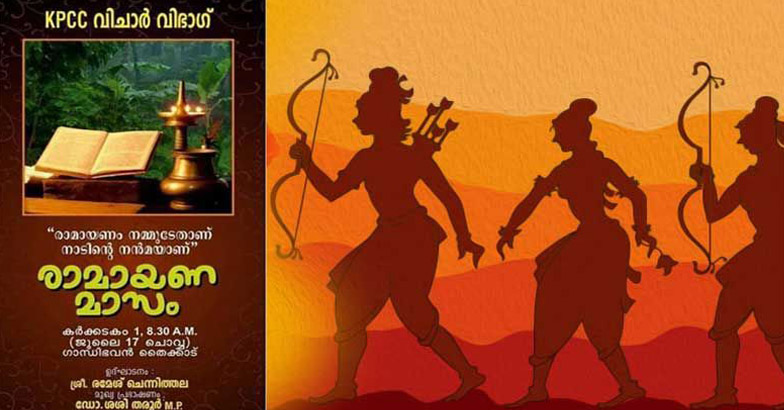SPOTLIGHTS ON THE RAMAYANAM -14. Sri Swami Premananda
-----------------------------------------------------
Saturday, August 15, 2020. 8 : 34. PM.
IV. IN WORLD LITERATURE
Post-14.
---------------------------------------------------
1.
Before we go over to explain the esotericism of the Ramayana, let me say a few words about
the prevailing criticism about the veracity of various events mentioned in the epic.
*First, there is no doubt that early Indians had an approach to history which was rather
different from the present day attitude. The word for literature in India is Sahitya, i.e. which will
help in the progress and welfare of mankind. While writing history, maybe they kept the objective
of human welfare uppermost.
2.
*Secondly there may have been some intermingling of history and mythology. Although
mythology is said to be based on what C.G. Jung has called the ‘race-unconscious’ and therefore
projects the innate inhibited aspirations of a race; they did not draw any definite line of demarcation
between mythology and history. It is, therefore, possible that either some events were exaggerated
or new material interpolated which cannot pass the portals of history as is understood today.
3.
*Thirdly, some recent trends in Western thought had a great influence on the thinking of the
world, particularly on India which was a colony of the British for almost two centuries. In this trend,
the most important influence in recent times has been of Herbert Spencer who formulated the
theory of evolution much before Charles Darwin and Wallace. Spencer’s evolution has a wider
sweep and covers all physical and biological phenomena. According to him, the world is evolving
from worse to better. Conversely, as we go back in time, the civilisation would have been worse and
worse. As such, the state of affairs in India at present should be definitely better than they were a
few hundred or a few thousand years ago. Therefore it is just not possible that the people of ancient
India—or for that matter, of any country—could be more prosperous, more intelligent and more
advanced than at present. This philosophy cuts at the root of all ancient civilisations and treats the
facts of ancient world as fiction. India’s philosophy, on the other hand has an exactly opposite
approach than the evolutionary progressivism of Spencer. According to it, the world is going from
bad to worse—not necessarily in the material sense but in moral essence.
4.
The cycle of the universe begins with Satyayuga the age of truth, benevolence and moral rectitude,
but gradually degenerates into Treta, Dwapara and the age of Kali, during which moral values gradually go down.
After the worst comes to pass and only little morality is left in the world, one cycle of creation is
completed and the whole world is dissolved into nothingness, rising again with Satyayuga.
5.
This approach is nothing unusual to India. There are references in the literature of other
countries which speak of high civilisation in the past for which scientific explanations have yet to
be formulated. There are two courses open to us, either to reject them as fantasies or to undertake
research on modern lines to evaluate their truth.
6.
Let me refer to the Babylonian Etana epic deciphered from clay-tablet library of the
Assyrian king, Assurbanipal (669-662 BC). The actual origin of the epic is unknown but parts of it
are included in the much older epic of Gilgamesh written in the Akkadian language.
To be continued ...
===================================================================











Comments
Post a Comment